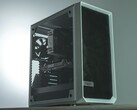Xray_OS is still a project in its infancy; it was born as a personal project with the goal of providing a fast and stable gaming experience to its creator. Still a one-man project, this Arch-based distro is described as more than just another Linux fork. According to the official website, Xray_OS is "the Linux you never expected" thanks to its set of unique tools that were developed from scratch, custom wallpapers, and optimized user experience.
The latest version arrived yesterday, and its highlights include KDE Plasma and systemd as default desktop and init software, as well as multiple fresh packages, including bind 9.20.12, gcc 15.2.1, flatpak 1.16.1, grub 2.12, gtk 4.18.6, the 6.16.4 kernel, Python 3.13.7, vim 9.1, and more. For now, the GPU driver detection feature still needs adjustments, so it has to be used with caution.
This distro features Tolito, a custom AUR helper that makes the user's life much easier by building and downloading packages from curated PKGBUILDs, and also features automatic fallback to the standard AUR. Two of its highlights are the ability to install DaVinci Resolve without errors and the Pacman-compatible syntax.
The Tolitica custom welcome app allows the user to easily change the shell (bash, fish, and zsh are available), add/remove gaming packages, enable/disable Snapd and Flatpak, and access system configuration shortcuts, as well as manage drives.
Xray_OS is free to download and use. The system requirements are reasonable: 64-bit processor, 2 GB system memory (at least 4 GB recommended), 20 GB drive space, UEFI or Legacy BIOS support. There are two ISO files available for download, namely one with Calamares and the other with a custom installer.
Source(s)
SourceForge (main project page)
Xray-Technologies ("About Xray_OS" page)






















